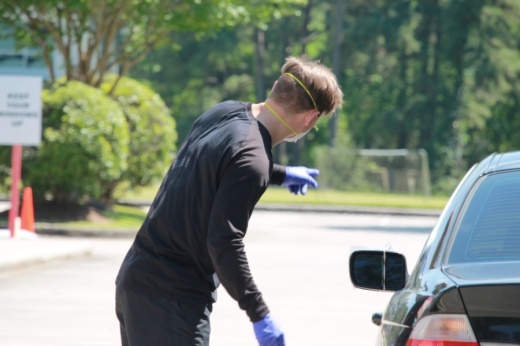"We have maxed out every day. I get a text every morning at 10:30 saying the gates are closed," Houston Health Department Director Steve Williams said of the free sites' ability to test 500 people per day.
On the same day, the city health department reported 987 new positive cases of the coronavirus from tests administered between June 14 and June 22.
While the funding’s end date is approaching, Williams said the department will try to keep the sites at Butler and Delmar stadiums open with funding from the CARES Act or the Texas Department of Emergency Management.
He said the department’s goal is to eventually shift away from the stadium drive-thru model and toward adding more mobile testing sites that allow for greater access throughout the city. Currently, the city runs over 20 mobile testing sites.
“Our major testing sites are efficient, but they’re not connected to a [health care] provider, so it’s not the best-case scenario for testing, but because of the demand and because we’re in the middle of a pandemic we have those testing sites up,” Williams said.
He said the department needs more time, however, to ramp up the mobile approach, and he does not want the two major sites to close until he knows the same amount of testing or more can be done throughout the city without the stadiums in use.
An abrupt closure of the sites, which have tested 60,000 people since opening in late March and early April, would result in a “catastrophic cascade of consequences,” Houston Director of Emergency Medicine Dr. David Persse said in a letter to the deputy U.S. surgeon general appealing for continued federal funding.
“People need to take this very seriously. We have the power to do this. The masks we wear are highly effective,” he said. “One person will infect on average of another 2.5 people, and without any precautions, that turns into 406 people who are infected within 30 days.”
At the rate of growth the city is facing, Williams said contact tracers are unable to keep up with tracking down those who have come in contact with everyone who has received positive test results.
“I don’t know that we could ever develop the capacity to hire enough contact tracers to keep up with this volume of positive cases,” he said.
As of June 23, Harris County ICU beds were at 92% capacity, with 32% of those occupied by confirmed or suspected coronavirus patients, according to data from the Southeast Texas Regional Advisory Committee.
The Texas Medical Center calculated that its hospital system could exceed its normal ICU capacity as soon as June 25, forcing the system to enter into surge capacity. To accommodate the area’s need, Texas Children’s Hospital announced June 23 it would begin treating adult patients as well.
Texas Gov. Greg Abbott has said state reopening protocols supersede local orders, but Mayor Sylvester Turner said the county’s new order requiring all businesses to require customers and employees to wear masks is part of a key strategy to slow the spread of the virus. He also said he will work with the Houston fire and police departments to monitor businesses that are violating capacity rules and report them to the Texas Alcoholic Beverage Commission. In recent days, the TABC has been temporarily suspending the liquor licenses of bars and restaurants violating capacity requirements, including several in Houston.
“The numbers are moving in the wrong direction; we are asking people again to mask up, practice social distancing, proper hygiene and hand-washing, and hopefully in two to three weeks [we] will start to see a leveling off and not the continuous rise,” Turner said.
Find area coronavirus testing sites and information here.





